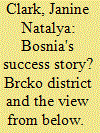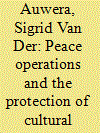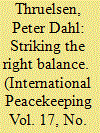|
|
|
Sort Order |
|
|
|
Items / Page
|
|
|
|
|
|
|
| Srl | Item |
| 1 |
ID:
093888


|
|
|
|
|
| Publication |
2010.
|
| Summary/Abstract |
Conflict prevention, more than other fields of international politics and foreign policy, is characterized by a multiplicity of state and non-state actors, giving rise to particularly complex coordination challenges. This article evaluates the extent to which the German response to these challenges, the action plan for civilian conflict prevention, has succeeded in its aim of improving coordination to increase policy coherence between different governmental agencies as well as with civil society actors. It finds that although the general approach is indeed promising, the government's lack of commitment prevents it from tapping into the action plan's full potential.
|
|
|
|
|
|
|
|
|
|
|
|
|
|
|
|
| 2 |
ID:
093886


|
|
|
|
|
| Publication |
2010.
|
| Summary/Abstract |
Situated in the far northeastern corner of Bosnia and Herzegovina, Brcko District is widely heralded as a successful multi-ethnic society. Such portrayals are typically 'top down' and centred on institutions, yet it cannot be assumed that multi-ethnicity at the institutional level necessarily translates into everyday relations between Brcko's ethnic groups. Based on qualitative interview data, this article explores Brcko from the 'bottom up', through a focus on inter-ethnic relations in everyday life. Its central argument is that viewing Brcko through this additional lens not only raises important questions about the District's image as a success story but also, and more broadly, has significant implications in highlighting the limitations of liberal peacebuilding and the importance of 'peacebuilding from below'.
|
|
|
|
|
|
|
|
|
|
|
|
|
|
|
|
| 3 |
ID:
093876


|
|
|
|
|
| Publication |
2010.
|
| Summary/Abstract |
Since armed conflicts are based increasingly on politics of identity, the protection of cultural property is likely to become continuously more important during peace operations. The extent to which peace operations are obligated to protect cultural property is, however, not always clear. This article explains why and to what extent peace operations ought to be required to protect cultural property. It first explores the way that the protection of cultural property can contribute to the overall aim of an operation. Second, the extent, from a legal standpoint, to which peace operations must respect cultural property is elaborated - and whether peace operations must refrain from damaging cultural property. Finally, the article analyses whether peace forces are obligated by international law to actively protect cultural property. Thus, whether they are responsible for the protection of cultural property from the depredations of others is questioned. The study contends that, on the one hand, the protection of cultural property is needed because it contributes to the overall aim of a peace mission, but that, on the other hand, a coherent legal framework is lacking.
|
|
|
|
|
|
|
|
|
|
|
|
|
|
|
|
| 4 |
ID:
093884


|
|
|
|
|
| Publication |
2010.
|
| Summary/Abstract |
This article demonstrates that there are more similarities between peacekeeping and counter-insurgency than often recognized. In today's 'war among the people', the counter-insurgent cannot succeed with offensive military capabilities alone and must seek to apply also non-kinetic and defensive methods; whereas the peacekeeper often is forced to apply 'robust' and kinetic means to implement a mandate. As a result, the two concepts seem to be converging and share some commonalities. The article compares the UN Department of Peacekeeping Operations 'capstone doctrine' and the US Army Counterinsurgency Field Manual to argue that the two doctrines share similarities in six areas: (1) a focus on civilian solutions; (2) a need for protection of civilians; (3) international coherence; (4) host-nation ownership; (5) use of intelligence in support of operations; (6) limitations on the use of force. The article suggests areas where the two doctrines could mesh with each other.
|
|
|
|
|
|
|
|
|
|
|
|
|
|
|
|
| 5 |
ID:
093882


|
|
|
|
|
| Publication |
2010.
|
| Summary/Abstract |
Studies of peacekeeping have helped to reveal the complexities, dilemmas and challenges of operations since their inception, and almost certainly into the future. Yet, despite the empirical and theoretical breadth of this canon, the field continues to be dominated by political science, development studies, international law and military studies, whose scholars tend to draw on 'problem-solving', macro-level and positivist perspectives in their writings. The impact of post-structural and post-positivist epistemologies developed in sociology, human geography and cultural studies remain marginal in the field. Given this, the present article seeks to complement and develop the study of peacekeeping through its framing of blue-helmet activity as embodied, spatial-security practice that is performed 'out front' for the 'beneficiary' audience. In so doing we draw on critical geopolitics, military/human geography and sociological theorizing with a focus on space and performance. Our main aim is to show how the concepts of space and performance can be used to illuminate perceptions of everyday security by recourse to a modest, illustrative empirical component based on fieldwork in Haiti, Kosovo and Liberia.
|
|
|
|
|
|
|
|
|
|
|
|
|
|
|
|
| 6 |
ID:
093887


|
|
|
|
|
| Publication |
2010.
|
| Summary/Abstract |
A well-trained, professional police force dedicated to upholding the rule of law and trusted by the population is essential to fighting the insurgency in Afghanistan and creating stability. However, the police programmes in Afghanistan have often been dominated by different national agendas and hampered by too few resources and lack of strategic guidance. These issues pose an enormous challenge for the Afghan government and the international community in rebuilding the police. This article argues that it is imperative that the international effort strike a balance between the short-term needs of fighting an insurgency and the long-term needs of establishing an effective sustainable policing capability when building up the police force - and that the process must not be subject merely to satisfying current security challenges or traditional state-building needs.
|
|
|
|
|
|
|
|
|
|
|
|
|
|
|
|
| 7 |
ID:
093880


|
|
|
|
|
| Publication |
2010.
|
| Summary/Abstract |
In the first decade of the new millennium, with the adoption at the UN of the 'responsibility to protect' as the organizing concept for intervention, non-governmental organizations (NGOs) emerge as increasingly important partners in international peacekeeping operations. Postmodernist analysts of liberal international security have critically addressed the growing role of international interventionism as well as NGOs. The literature, however, has overstated the effectiveness of liberal biopolitical rationalities in successfully inscribing all political actors, to include NGOs, into their script. Based upon the exploration of discourses of UN reform and integrated peacekeeping, this article argues that, while in the post-Cold-War world international security is reconceptualized in biopolitical terms and calculating rationalities are deployed, the implementation of the biopolitical liberal script is ridden with ambiguities, indecisions and stumbling blocks. International liberal mechanisms for governing disorder produce not only effects of domination and control but also spaces for political appropriation and contestation by NGOs and civil society.
|
|
|
|
|
|
|
|
|
|
|
|
|
|
|
|
|
|
|
|
|